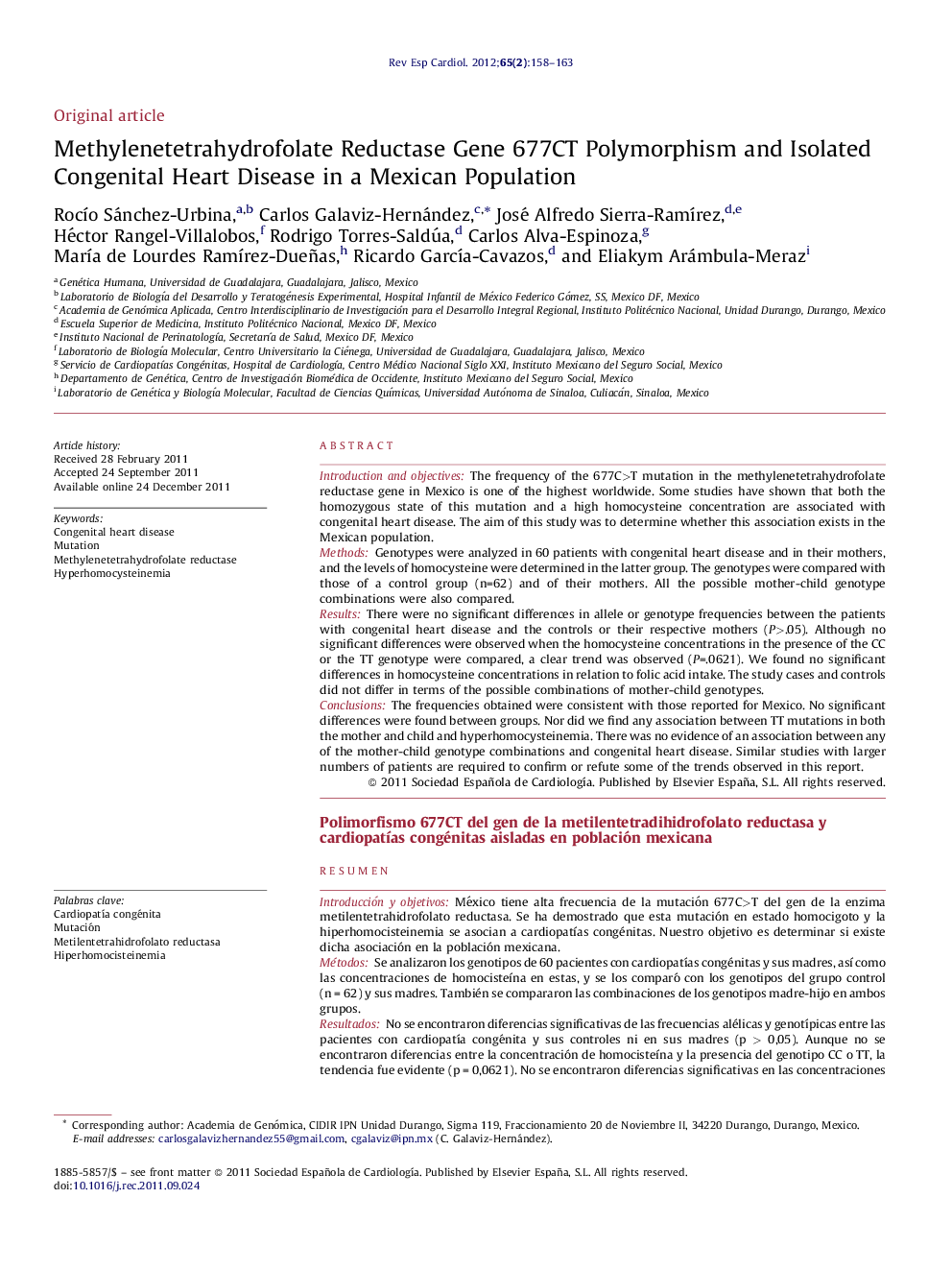| کد مقاله | کد نشریه | سال انتشار | مقاله انگلیسی | نسخه تمام متن |
|---|---|---|---|---|
| 3018196 | 1182158 | 2012 | 6 صفحه PDF | دانلود رایگان |

Introduction and objectivesThe frequency of the 677C>T mutation in the methylenetetrahydrofolate reductase gene in Mexico is one of the highest worldwide. Some studies have shown that both the homozygous state of this mutation and a high homocysteine concentration are associated with congenital heart disease. The aim of this study was to determine whether this association exists in the Mexican population.MethodsGenotypes were analyzed in 60 patients with congenital heart disease and in their mothers, and the levels of homocysteine were determined in the latter group. The genotypes were compared with those of a control group (n=62) and of their mothers. All the possible mother-child genotype combinations were also compared.ResultsThere were no significant differences in allele or genotype frequencies between the patients with congenital heart disease and the controls or their respective mothers (P>.05). Although no significant differences were observed when the homocysteine concentrations in the presence of the CC or the TT genotype were compared, a clear trend was observed (P=.0621). We found no significant differences in homocysteine concentrations in relation to folic acid intake. The study cases and controls did not differ in terms of the possible combinations of mother-child genotypes.ConclusionsThe frequencies obtained were consistent with those reported for Mexico. No significant differences were found between groups. Nor did we find any association between TT mutations in both the mother and child and hyperhomocysteinemia. There was no evidence of an association between any of the mother-child genotype combinations and congenital heart disease. Similar studies with larger numbers of patients are required to confirm or refute some of the trends observed in this report.
ResumenIntroducción y objetivosMéxico tiene alta frecuencia de la mutación 677C>T del gen de la enzima metilentetrahidrofolato reductasa. Se ha demostrado que esta mutación en estado homocigoto y la hiperhomocisteinemia se asocian a cardiopatías congénitas. Nuestro objetivo es determinar si existe dicha asociación en la población mexicana.MétodosSe analizaron los genotipos de 60 pacientes con cardiopatías congénitas y sus madres, así como las concentraciones de homocisteína en estas, y se los comparó con los genotipos del grupo control (n = 62) y sus madres. También se compararon las combinaciones de los genotipos madre-hijo en ambos grupos.ResultadosNo se encontraron diferencias significativas de las frecuencias alélicas y genotípicas entre las pacientes con cardiopatía congénita y sus controles ni en sus madres (p > 0,05). Aunque no se encontraron diferencias entre la concentración de homocisteína y la presencia del genotipo CC o TT, la tendencia fue evidente (p = 0,0621). No se encontraron diferencias significativas en las concentraciones de homocisteína dependientes de la ingesta de ácido fólico. El análisis de las diferentes combinaciones genotípicas del binomio madre-hijo entre casos y controles no mostró diferencias significativas.ConclusionesLas frecuencias obtenidas concuerdan con las publicadas para nuestro país. No se encontraron diferencias significativas entre los grupos. Tampoco se encontró asociación de la mutación TT con hiperhomocisteinemia. No hay asociación entre las combinaciones genotípicas madre-hijo y las cardiopatías. Es necesario desarrollar estudios semejantes con un mayor número de pacientes para confirmar o descartar algunas tendencias observadas en este trabajo.
Journal: Revista Española de Cardiología (English Edition) - Volume 65, Issue 2, February 2012, Pages 158–163